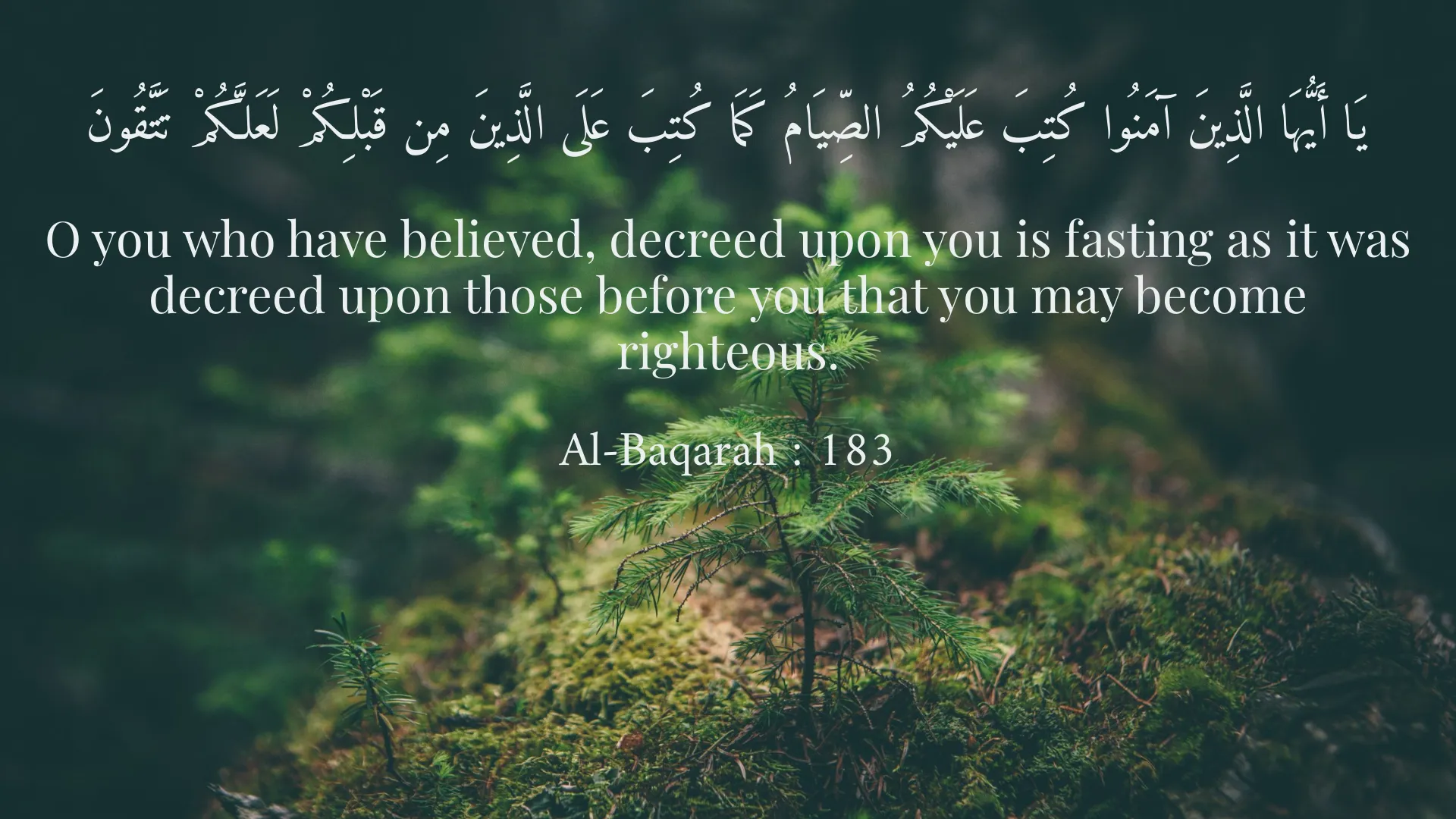Quranic Answer

Being a person of piety encapsulates a deep commitment to following divine guidance and nurturing a close and meaningful relationship with God. It is an integral aspect of a believer's life, influencing their actions, thoughts, and interactions with the world around them. In the Holy Quran, Allah commands believers to embody piety, serving as a fundamental principle woven throughout Islamic teachings. The significance of piety is underscored by various verses in the Quran, each emphasizing a unique aspect of spiritual and moral development. One of the most striking examples can be found in Surah Al-Baqarah, verse 183, which states: 'O you who have believed, decreed upon you is fasting as it was decreed upon those before you that you may become righteous.' This profound statement articulates a crucial dimension of piety—fasting during the holy month of Ramadan. The act of fasting is not merely a physical abstention from food and drink but an essential exercise in self-discipline and spiritual awareness. Through this practice, individuals cultivate a greater consciousness of God's presence and a profound desire to adhere to divine guidance. The discipline that accompanies fasting fortifies the believer’s moral framework, helping to shield them from temptations and sins. As one refrains from indulgences, they learn to exercise control over their desires, fostering an inner strength that translates into other areas of life. Piety, however, extends beyond the personal realm. In Surah Al-Imran, verse 102, Allah states: 'O you who have believed, fear Allah as He should be feared and do not die except as Muslims.' This verse underscores an essential tenet of piety—the recognition of God's majesty and the importance of living in accordance with His commands throughout one's life. The call to 'fear Allah' is not one of terror but rather a profound reverence that inspires individuals to align their actions with divine will. It serves as a reminder that piety is not a sporadic endeavor but a continuous journey, necessitating that believers incorporate God’s commands into every aspect of their lives. This embodies an ongoing commitment to moral integrity and an affirmation of faith that must resonate in both public and private conduct. Moreover, piety manifests itself in relationships with others. The Quran emphasizes the importance of kindness, compassion, and charity toward parents, relatives, the orphans, and the needy. Engaging positively with others is a core component of a pious life, reflecting the love of God in daily actions. The Prophet Muhammad (peace be upon him) exemplified this principle, showcasing how a pious individual reaches out to those around them with love, empathy, and support. It is through these acts of kindness and altruism that the spirit of piety truly flourishes. Community plays a significant role in nurturing piety as well. A believer’s engagement within their community can enhance their spiritual journey. By participating in communal prayers, charity events, and educational activities, individuals develop a sense of belonging and collective responsibility that reinforces their pious values. This interconnectedness reminds believers of their shared responsibilities in upholding justice, integrity, and compassion within society. In this light, piety is not solely an individual pursuit but a communal ideal, inspiring collective efforts toward good. Additionally, piety can be seen as a pathway to personal growth and self-discovery. Engaging in spiritual practices like prayer, reflection, and the reading of the Quran fosters a deeper understanding of oneself and one's purpose in life. Such activities serve as an avenue for seekers to connect with God, enabling them to derive meaning and clarity from their experiences. The inner peace achieved through these practices aids believers in navigating life's challenges with grace and patience, further asserting the transformative power of piety. In modern society, where distractions and worldly temptations abound, the call to piety remains incredibly relevant. As individuals are inundated with various pressures and challenges, maintaining a relationship with God and adhering to a path of righteousness provides a solid foundation of hope and resilience. It is crucial for believers to carve out time for spiritual reflection and prioritize acts that strengthen their connection to God while fostering meaningful relationships with others. This commitment to piety serves as a guiding light, illuminating paths of purpose and fulfillment amidst the chaos of contemporary life. In conclusion, the essence of being a pious individual transcends mere religious observance; it embodies a holistic approach to living that interweaves spiritual devotion with moral integrity and social responsibility. It encapsulates the commitment to remaining steadfast in faith, engaging positively with the community, and fostering a genuine love for God and humanity. Through continuous efforts to embody piety in daily life, believers can cultivate a profound sense of fulfillment and legacy that echoes through generations. The journey of piety is, ultimately, a personal and communal pilgrimage toward truth, love, and divine proximity.
Related Verses
يَا أَيُّهَا الَّذِينَ آمَنُوا كُتِبَ عَلَيْكُمُ الصِّيَامُ كَمَا كُتِبَ عَلَى الَّذِينَ مِن قَبْلِكُمْ لَعَلَّكُمْ تَتَّقُونَ
O you who have believed, decreed upon you is fasting as it was decreed upon those before you that you may become righteous.
Al-Baqarah : 183
يَا أَيُّهَا الَّذِينَ آمَنُوا اتَّقُوا اللَّهَ حَقَّ تُقَاتِهِ وَلَا تَمُوتُنَّ إِلَّا وَأَنتُمْ مُسْلِمُونَ
O you who have believed, fear Allah as He should be feared and do not die except as Muslims.
Aal-E-Imran : 102
Short Story
One day, two old friends decided to reunite and discuss piety. One of them mentioned that ever since he became closer to God, his life had been filled with blessings and peace. The other said he too was trying to get closer to piety by doing good deeds. They decided to engage in charitable activities together and support each other to remain steadfast in their journey toward piety.